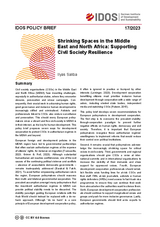Policy Brief
Shrinking spaces in the Middle East and North Africa: supporting resilience of civil society
Saliba, IlyasPolicy Brief (17/2023)
Bonn: German Institute of Development and Sustainability (IDOS)
DOI: https://doi.org/10.23661/ipb17.2023.v2.0
2nd, revised edition
The 1st edition is no longer available.
Civil society organisations (CSOs) in the Middle East and North Africa (MENA) face mounting challenges, especially in authoritarian states, where they encounter closures, persecution and smear campaigns. Consequently, their crucial work in advancing human rights, good governance and inclusive human development is increasingly stifled and criminalised. Activists and professionals linked to CSOs also endure surveillance and persecution. This should worry European policymakers since a vibrant and free civil society in MENA is in their interest, as it is key for human development. This policy brief proposes seven ways for development cooperation to protect CSOs in authoritarian regimes in the MENA and beyond.
European foreign and development policies in the MENA region have led to governmental partnerships that often sustain authoritarian regimes at the expense of citizens’ rights, for instance on migration (Francavilla, 2023; Grimm & Roll, 2023). Although substantial humanitarian aid reaches conflict zones, one of the root causes of the continuing political violence and conflicts – absence of accountable democratic governments – remains inadequately addressed (Barakat & Fakih, 2021). To avoid further empowering authoritarian rule in the region, European policymakers should reassess their multi- and bilateral governmental cooperation. The prevalent assumption amongst many policymakers that the incumbent authoritarian regimes in MENA can provide political stability needs to be discarded. The stability paradigm guiding European relations with the Arab World should instead be replaced with a do-no-harm approach. Although “do no harm” is a core principle of European development cooperation policy, it often is ignored in practice or trumped by other interests (Leininger, 2023). Development cooperation benefitting citizens must prioritise inclusive human development through cooperation with a wide range of actors, including elected state bodies, independent media and watchdog CSOs (Rutzen, 2015). This policy brief develops seven recommendations for European policymakers in development cooperation. The first step is to overcome the prevalent stability-through-cooperation paradigm to prevent further negative effects on human rights, democracy and civil society. Therefore, it is important that European policymakers recognise these authoritarian regimes’ unwillingness to implement reforms that would reduce their control over political institutions. Second, it remains crucial that policymakers acknowledge the increasingly shrinking space for critical voices in civil society. Third, governments and regional organisations should give CSOs a voice at international summits and in international organisations to increase the visibility of their demands and show support for oppressed voices. Fourth, European development cooperation professionals should establish flexible crisis funding lines for at-risk CSOs and their staff. Fifth, at-risk journalists, activists or human rights defenders (HRDs) need access to fast-track visa programmes to ensure they can continue their work from abroad when the authorities want to silence them. Sixth, European development cooperation profession-als should continue to support marginalised voices and groups and push for more inclusive governance. Lastly, European governments should limit arms exports to authoritarian regimes.
Kontakt
Cornelia Hornschild
Koordinatorin Publikationen
E-Mail Cornelia.Hornschild@idos-research.de
Telefon +49 (0)228 94927-135
Fax +49 (0)228 94927-130
Alexandra Fante
Bibliothekarin/Open Access-Koordinatorin
E-Mail Alexandra.Fante@idos-research.de
Telefon +49 (0)228 94927-321
Fax +49 (0)228 94927-130



